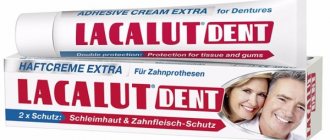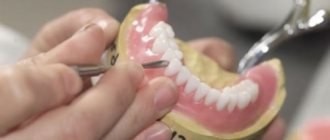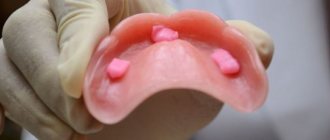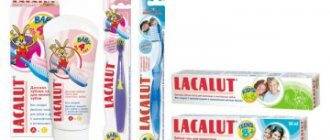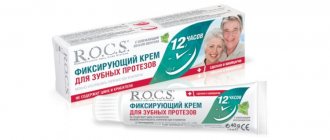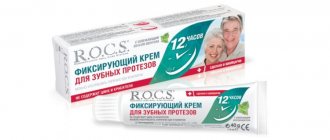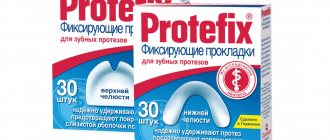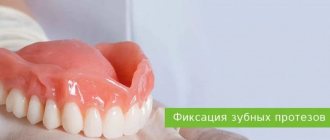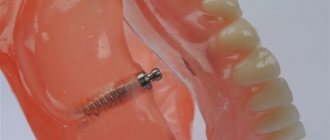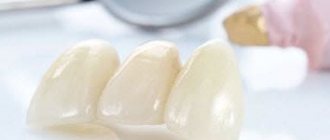In many cases, a denture is a solution to the problem of missing several teeth in a row. At the same time, the choice in prosthetic instruments is so great that patients can afford orthodontic devices of a wide variety of designs, different materials and price categories. As you know, all prosthetic devices are divided into removable and non-removable. The latter are distinguished by a more rigid permanent fixation, but removable dentures become optimal for many, since they allow the dental structure to be removed if necessary.
Even if the removable denture was made from expensive materials by the best specialists (as in the LeaderStom clinic), then even in this case, there may be voids in some places between the prosthetic device and the gum tissue, and abrasions or areas of increased pressure on the gum in others. This fact is not considered a defect or defect of dentists: the fact is that such minimal defects are eliminated themselves during the period of adaptation to the prosthesis, or by using special fixing agents and materials.
Review of the best creams for fixing dentures: features of composition and application
Article navigation
- Why do we need fixing agents for dentures?
- The main components of creams that provide fixation
- Rating of the best creams
- 1. “Fittident” (Austria)
- 2. "Rox" (Switzerland)
- 3. "President" (Italy)
- 4. "Protefix" (Germany)
- 5. “Lakalut” (Germany)
- 6. Corega (Ireland)
- How to choose the most suitable product
- How to use the composition correctly
- Side effects of using the compounds
Question for a specialist
Most removable dental structures are attached to the soft tissue of the gums and palate. To prevent their loss, ensure reliable fixation and full performance of their intended functions, use denture cream. The product is suitable for wearing acrylic, nylon and silicone products. About which cream for dentures is better, the features of choice and the nuances of use later in the article.
Why do we need fixing agents for dentures?
Cream for dentures provides not only reliable fastening of the product in the oral cavity. At the same time it performs the following functions:
- accelerates adaptation to the design, since it eliminates chafing of the mucous membrane,
- prevents the accumulation of food masses between the product and the gums, because adheres to the mucous membrane more tightly,
- provides protection of the mucous membrane from the mechanical impact of the prosthetic structure - you will experience less pain and discomfort, both at rest and when eating,
- prevents gum inflammation (some products contain anti-inflammatory components),
- Gives freshness to your breath thanks to the additives included in the composition (not all).
Don't know what type of prosthetics to choose?
We will help in the selection, advise where to read more information and compare types of prosthetics.
Consultation with an orthopedic doctor in Moscow clinics is free! Call now or request a call
Working hours: from 9:00 to 21:00 - seven days a week
Fixing strips
A remedy such as fixing strips is more often used for various malocclusion pathologies.
In addition, strips are useful if it is difficult to get used to dentures. They are made from a special material that ensures good fixation of removable structures. Additionally, the strips also protect the gums from damage. This product is very easy to use. Usually, for good fixation, the strip is immersed in warm water for a few seconds. Then it is applied to the prosthesis and inserted into the mouth together with it.
The main components of creams that provide fixation
Almost all creams for fixing removable dentures have a similar composition, differing only in some components. For example, substances of natural origin (plant and/or animal) may be added to them. Many manufacturers add aromatic ingredients to improve the taste of the product and ensure freshness in the mouth.
It is important to know! For people prone to allergic reactions, it is better to purchase creams for attaching dentures that have a neutral, hypoallergenic composition. Some manufacturers produce different series of products that allow you to choose the best option. Pay attention to flavoring additives - most often it is mint, eucalyptus, less often - citrus fruits and even chocolate.
Many creams that provide reliable fixation of removable dental structures contain zinc. Its presence allows you to achieve the most durable adhesion of surfaces. And at the same time, it has an excellent wound-healing effect - useful if new teeth are chafed. Many people are afraid to use products with zinc. However, its negative effect on the body occurs mainly in case of ingestion. Therefore, it is important to use this drug correctly: apply only once a day and in small quantities.
Creams and gels
Fixing a denture with cream or gel, which to choose? Both of these remedies are identical in their effectiveness and method of use. The only difference between them is the greater fluidity of the gels with the ability to form a thinner layer. Creams have a denser consistency and contain an additive of aromatic oils.
Rules for the use of gels and creams for dentures
Typically, experts recommend using creams to fix dentures immediately after prosthetics because of their ease of dosing and use.
But the amount of gel is more difficult to correctly calculate. If you increase its amount, the gel will not harden and hold the prosthesis normally.
Creams are applied to the lower segment of the denture, which is then pressed firmly against the gums. The creams reliably fix the structure for 12-24 hours.
The cream is especially recommended for patients with excessive salivation.
The most common and high-quality fixation creams are Rocs, Lacalut, Protefix, President, Corega, etc.
To choose the right means of fixation, you need to know such subtleties
- It is better to choose gels and creams with neutral scents. Fragrances in them are contraindicated for people with allergies.
- Preference should be given to waterproof products due to their longer action and better tightness. Waterproof types of compositions better protect against the penetration of food under the prosthesis and the development of unpleasant odors or inflammation.
- It is better to avoid using products containing zinc due to its toxic effect on the body (nervous and skeletal systems).
- Products with a gel-like consistency are more economical due to the ability to form a thinner layer during fixation.
Rating of the best creams
To choose the best cream for dentures, you will need to not just read user reviews online, but carefully study the composition of the product and consult with a specialist. In most cases, you will be able to give preference to a particular drug after using several options, that is, after testing it through personal experience. This is due to the individual characteristics of the body and the different properties of the materials of orthopedic structures. The rating of creams presented below is based on the opinion of both doctors and people who use them.
"Fittident" (Austria)
Fittydent is the best denture cream according to most users. Its only drawback is its high cost - about 500 rubles per tube. It has gained great popularity due to its harmless composition (no zinc or dyes), high resistance to liquids, and economical consumption. “Fittident” reliably fixes the removable structure in the mouth for 12 hours – this is more than enough for a day of use.
Types of fixation of removable dentures on implants
A removable denture on implants is a structure that replaces lost teeth. It consists of artificial crowns and an acrylic base, attached to artificial roots implanted into the jaw. The patient can remove such structures independently without the help of a doctor.
There are definitely advantages to implant prosthetics. The products are firmly attached to the mouth and food particles do not get under them, as happens with removable suction cups. The patient can easily remove the artificial teeth to clean and prepare them.
But the system is not without its drawbacks. It is less durable compared to fixed artificial jaws that have a titanium arch at the base. Products without an arc break faster and require frequent correction. Due to the possibility of loosening and slight displacement of artificial roots, removable prosthetics are more often considered as a temporary way to mask visual defects.
Methods by which the prosthesis is attached to the mouth:
- Beam fixation.
The implants are connected to each other by a titanium arch (beam), on which orthopedic systems are then placed. - Push-button fastening.
An abutment is placed on each titanium implant. It is connected to silicone matrices (recesses) in the artificial jaw.
"Rox" (Switzerland)
ROCS (“Rox”) is the best denture cream in terms of cost and quality. It contains special substances that prevent and eliminate the inflammatory process, as well as compounds that maintain the normal balance of beneficial microorganisms in the oral cavity. Another advantage is resistance to high temperatures of consumed foods and liquids. In addition, the product has a low price (on average 250 rubles per tube), ensures stable retention of the prosthesis for 12 hours, and gives freshness to the breath thanks to the mint component. Rox contains no zinc or dyes.
“I was forced to install a removable denture on the upper jaw, I spent a long time looking for some kind of glue, because it was constantly falling out. I tried everything... I settled on Rox. Now I feel confident and comfortable in any situation.” Olga Sergeevna, 58 years old
Caring for removable dentures
Although a removable denture is an artificial structure, it still requires careful and high-quality care, because in fact, after installation, it becomes part of your body. Proper care of removable dentures guarantees comfortable wearing of the structure and its durability.
There are rules that must be followed for those who want to keep their dentures for a long time.
Rules for caring for removable dentures
After each meal, try to remove the denture to rinse it under running water. This not only ensures the comfort of wearing the denture (small particles of food remaining under the structure are very disturbing), but also guarantees the protection of the gums from the effects of pathogenic bacteria. Those pieces of food that remain under dentures are a breeding ground for microbes that can cause gum disease.
Cleaning a removable denture should be done with a soft-bristled toothbrush so as not to damage the integrity of the structure. When cleaning, special attention should be paid to: the part that is in direct contact with the gum, areas near the salivary gland canals, the front part of the lower jaw dentures and the side part of the upper jaw denture.
You can use regular toothpastes to clean your dentures. But try not to clean your dentures with whitening toothpaste. Such pastes contain strong abrasive substances that can damage the material of the structure.
Before going to bed, after the adaptation period has passed, the denture should either be left in the mouth or removed. You should clean your denture not only after each meal, but also before going to bed. It is necessary to store dentures at night in purified water (even boiled water will do) or a special composition that you can buy in pharmacies.
In case of breathing problems, sleep disorders, snoring and teeth grinding, dentures must be removed at night. If you are absolutely sure that you have one of the listed diseases, tell your dentist about it at your appointment. You will be recommended a treatment that will relieve you of your sleep problems. If you are concerned about your prosthesis or are just about to start prosthetics, we suggest you contact our Dentistry clinic on Shchelkovskaya Diamed. Convenient location, attentive doctors, and extensive experience in working with removable dentures guarantee you the accuracy of the work performed and the comfort of wearing a removable denture. You can sign up for the clinic by calling 8 or using the online registration form.
Eating with removable dentures
Caring for removable dentures involves regular disinfection. The prosthesis is placed in water in which a special disinfectant capsule is dissolved. It is enough to place the prosthesis in the prepared solution for only fifteen minutes.
To maintain the beautiful appearance of the prosthesis for as long as possible, try to consume less products with dyes, as well as tea, coffee, wine and other alcohol. Smoking also significantly increases the likelihood of darkening and discoloration of the denture. Avoid getting sticky food (taffy, chewing gum) on your dentures. Crackers, hard nuts, ice - all this should not be chewed if you do not want the prosthesis or artificial tooth to break.
"President" (Italy)
Fixing cream for dentures PresiDENT (“President”) creates a dense layer under the structure that prevents particles of food mass from entering. The manufacturer assures that the effect of the product lasts throughout the day and can reach 36 hours. The absence of allergies, economical consumption, low cost (within 250 rubles) and high quality of the composition allow it to occupy a high position in the TOP of means for retaining removable structures. However, many people are faced with the fact that they cannot buy this product in all pharmacy chains.
"Protefix" (Germany)
Among the positive properties of the popular cream for fixing dentures, Protefix (“Protefix”), we can note: economical consumption, excellent adhesion, dense structure that limits the penetration of food. The manufacturer has released three types of “Protefix”: without coloring and aromatic components (suitable for allergy sufferers), with mint, and with aloe. The product deservedly receives positive reviews from users due to its affordable price (about 200 rubles) and the possibility of use for increased sensitivity of the mucous membrane. Among the disadvantages, users note the inconvenience of the dispenser and the weakening of the fixation under the influence of hot food.
"Lakalut" (Germany)
Cream for removable dentures Lacalut (“Lakalyut”) is included in the rating of leaders due to the high degree of fixation and speed of setting with surfaces. You can eat food within five minutes after installing the structure in the oral cavity, and the structure will remain in place for a whole day. The composition of Lakalut contains, in addition to fixing components, anti-inflammatory compounds and substances that prevent unpleasant odors. Users consider the high cost to be a disadvantage of the product - about 400 rubles per tube.
Glue
Denture adhesive acts as a soft cushion to cushion movement between the jaw and the structure during chewing. It is used for fastening both removable and permanent dentures (fixing a crown, temporarily strengthening a tooth or a broken bridge).
Adhesives are usually water-based.
The disadvantage of this product is associated with the gradual dissolution of the components and loss of effectiveness of the composition.
Excess glue can irritate your gums. The most commonly used glue is from Protefix, Corega, and Fittident.
Corega (Ireland)
Cream for dentures Corega (“Corega”), along with positive reviews, has quite a lot of negative ones. Among the advantages are an affordable price (about 250 rubles), economical consumption, and the possibility of use for sensitive gums. Its use does not require preliminary drying of the structure. The negative aspects include the rapid dissolution of the product under the influence of water, which leads to a short period of operation - only 3-4 hours. The same property provokes the entry of the composition into the digestive tract during food intake.
How to choose the most suitable product
What should you pay attention to when choosing the best cream for fixing dentures? The main criteria are the following.
- fixing properties: if you rarely use dentures (for example, only to go out on a visit or to the store), then long-term fixation may be unnecessary. In this case, you can buy Corega. If the product is needed for a long time (12-hour working day), you should take a closer look at a stronger version of the composition,
- resistance to water: some compositions lose their fixing qualities under the influence of saliva or frequent consumption of drinks or liquid food. This is important to consider - reviews and personal observations will help here,
- features of the composition (the presence of aromatic and flavoring additives, the presence of anti-inflammatory components, zinc and others: paying attention to this parameter is important if you are prone to allergies or intolerance to any substances. It should be taken into account that some flavorings can change the taste of food,
- resistance to mechanical stress: this point is related to the load on the removable structure during chewing food, and depends on both the frequency of intake and the nature of the products consumed, the type of heat treatment,
- economical use: here it is necessary to consider not only the material capabilities of the user and the cost of the drug, but also the frequency of use of the product, its required optimal amount. So, if you rarely use the composition, you can afford to buy a high-quality cream and “turn a blind eye” to the high price.
REPROSTHETICS WITH ACRYLIC PROSTHETICS - RUB 150,000. instead of 180,000 rub. until January 15, 2022!
Re-prosthetics with an acrylic bridge on a metal frame (all included) up to 12 units.
Call now or request a call
On a note! Unstable fixation or other deficiencies do not always mean that the fixative cream for dentures is “bad.” If the product is not suitable, possible reasons may be: design features (material, shape, installation nuances) and the maxillofacial apparatus, as well as the volume of saliva secreted.
Recommendations for getting used to a prosthetic device
Dentist specialists from the LeaderStom network of clinics believe that the process of adaptation to a prosthetic device takes on average up to 2 months. The most difficult of them are the first two weeks. During this period, symptoms such as:
- difficulty speaking;
- difficulties with chewing and swallowing, leading to a gag reflex;
- sensation of sore gums or general discomfort from fixing the prosthesis;
- increased salivation.
The advantage of a removable denture is that in case of severe discomfort, the device can always be removed for a short time and rest. At first, it is recommended to wear the prosthetic device not during meals, but in the intervals between meals. The next stage of adaptation will be putting on the prosthesis at night. When the body has already gotten a little used to it, you can move on to fixative drugs.
With increased salivation, sucking candies are very helpful because they stimulate the swallowing reflex. It is recommended to drink plenty of water in small sips to teach the body to swallow with the presence of a prosthetic device.
During the period of adaptation to the prosthesis, you should adhere to a gentle diet and exclude solid foods. Do not worry if the installation of a removable denture has a negative impact on the taste of food. This is a quite common symptom that goes away on its own after two weeks of using the prosthesis and does not depend in any way on the fixation agent.
Difficulties in speaking while wearing a denture are also temporary, but most patients will need to work on it a little. The best way is to read aloud. If you have grandchildren, then bedtime stories will not only be useful for them, but also effective practice for your pronunciation.
In rare cases, wearing a prosthesis causes so-called individual intolerance, when psychological discomfort exceeds physical discomfort. However, such a diagnosis can only be made after 2-3 weeks, when at the physiological level the adaptation of the prosthetic device has been successful, but the patient still continues to experience severe discomfort. In such a situation, you can simply postpone wearing the prosthesis and wait for a more favorable moment. There are many cases where the prosthesis “took root” two to three months after its first installation and fixation.
How to use the composition correctly
Fixation cream must be used according to the instructions. The general rules are the following:
- the product is applied to the prosthesis from the inside, only on the lines intended for this purpose and in a small amount (if there is a lot of it, the fixation strength weakens). The recommended volume is usually indicated in the instructions, and the most optimal for a particular person is established experimentally,
- strong creams for dentures containing zinc should not be applied more than once a day - the risk of neurological disorders increases,
- the structure must be clean: before applying the fixing composition, it should be washed with warm water (if necessary, ordinary soap can be used) and wiped dry with a lint-free cloth,
- After removing the removable denture, the fixing cream must be removed: to clean the structure from residual composition, use a toothbrush with extra soft bristles and toothpaste intended for small children (due to their low abrasiveness, such pastes do not damage the surface of the product).
On a note! If, when removing the structure before going to bed, it turns out that it is securely fastened, it is permissible to leave it until the morning. Next time, the amount of composition applied should be reduced.
Recommendations for patients on the use of removable dentures
Dear patients, remain calm in the first days after the installation of dentures, remember that wearing dentures requires getting used to. It should be kept in mind that getting used to dentures is a gradual process. At first, you may have difficulty eating, your speech may become unclear, your sense of taste may change, and you may experience psychological uncertainty. At first, using removable dentures may cause a foreign body sensation, nausea, and increased salivation. Gradually, these phenomena will decrease as you get used to removable dentures. The main thing is to remember that all these sensations are normal, natural and surmountable. Almost all patients who have removable dentures go through similar difficulties, but following some rules and recommendations from your doctor will help you cope with these problems.
While in the dentist's chair, try to learn how to remove and put on the denture yourself. Then practice at home in front of a mirror, then without it. Before applying the prosthesis, you need to moisten it with water or use a fixative (if necessary). For increased gag reflex, mint or sour candies are recommended.
In order to better get used to the dentures and restore normal diction, it is recommended to read aloud (books, newspapers, magazines), and talk a lot.
You should not bite with your front teeth at first. Try to chew food with your side teeth at the same time (left and right at once). Food in the first days should not be solid. It is recommended to eat small pieces, even fruits and vegetables.
For the first 7 days you should eat only soft, pureed food.
Afterwards, you can move on to your normal diet that is familiar to you. We strongly recommend that you exclude very solid foods - crackers, nuts, etc.
For the first 7 days, do not remove the dentures at night.
If possible, wear them around the clock, removing them only for hygiene procedures. After this time, dentures must be removed at night!
For the first 7 days, dentures should be stored in a container with water.
After this period, dentures must be stored in an airtight container without water!
Please note that if you have pets, dentures should be kept out of their reach.
Complete adaptation to removable dentures will occur within two months!
Fixing agents.
Useful aids to help overcome the discomfort associated with wearing dentures are denture anchors. It is worth keeping in mind that the need for their use is determined by your attending physician.
There are 3 types of fixing agents:
Fixing gaskets. They are used for dentures of the upper and lower jaws and are usually recommended at the stage of getting used to the denture. Gaskets are especially effective for unfavorable jaw structure, age-related deformation of the gums, as well as atrophy of the alveolar process of the jaw. They are made of a soft, fibrous material and contain sodium alginate, which, when moistened, provides additional fixation of the prosthesis and protects against chafing and inflammation.
Fixing powder. Used for minor problems with dentures. The tasteless and odorless powder is produced on the basis of a substance of natural origin (sodium alginate). The fixing powder is convenient to take on trips; it is well tolerated and does not irritate the oral cavity.
Fixing cream. Used for complex problems with the fastening of prostheses. Recommended for reliable fixation of dentures with increased and normal salivation. It is easy to apply, retains its properties under the influence of hot and cold food, does not change the taste of food and drinks, and does not have a negative effect on the stomach. It is not washed off by saliva and is evenly distributed over the entire surface adjacent to the gum. Apply to wet dentures.
Caring for removable dentures.
- 1. We recommend storing dentures outside the oral cavity in a dry and clean sealed container. Before applying the prosthesis, you should moisten it in water and use a fixative (if necessary).
- 2. After each meal, the denture should be removed from the mouth and rinsed thoroughly under running water, using a brush to remove any remaining food. The denture must be clean!
- 3. Twice a day (morning and evening) clean the denture with toothpaste and a medium-hard brush (MEDIUM). It is advisable to clean dentures over a sink to avoid mechanical damage if they accidentally fall out of your hands.
- 4. You can use cleaning tablets, such as Protefix® cleaning tablets, which contain active oxygen. Without mechanically damaging the denture, they clean it and eliminate unpleasant odors, remove plaque and tartar, restore the natural color of the dentures and avoid infections in the oral cavity. We recommend that our patients use this method of hygienic care at least once a week if possible.
Correction of removable dentures.
- 1. 2-3 days after applying the prosthesis, you should see a doctor to monitor the fixation of the prosthesis.
- 2. If, while using dentures, severe pain occurs on the mucous membrane, then the dentures can be removed and consult a doctor for correction. The dentures should be in the mouth 2-3 hours before visiting the doctor so that the cause of the pain becomes obvious. The actual prosthesis correction procedure takes 5-15 minutes.
- 3. Do not adjust the prosthesis yourself! This may cause the prosthesis to break and void the warranty.
- 4. After correction of the prosthesis, you must not use it for 1-2 days. During this period, it should be used only to restore the aesthetics of the smile. During the healing period, it is advisable to rinse your mouth and take baths (hold the solution in your mouth) with herbal decoctions. Use a decoction of chamomile flowers, sage, oak bark, etc. For example, take 0.5 tablespoons of dry oak bark, brew in one glass of boiling water, cool, use the decoction 3-5 times a day.
Repairing dentures.
During the use of removable dentures, a fracture of the prosthesis or its individual parts (tooth, clasp, etc.) may occur. In this case, you need to contact the clinic. If a tooth(s) on which partial removable dentures are held or supported are lost, it is possible to weld an artificial tooth to the denture in place of the lost one. Repairing a removable denture takes 2-3 days. Repairs are made free of charge during the warranty period.
Side effects of using the compounds
Even the best denture creams can cause side effects. Most often, users indicate the following body reactions: swelling of the gums as a result of pressure from the structure or the development of an allergic reaction, headaches, taste disturbance, increased salivation, nausea, vomiting, discomfort in the digestive tract.
Various factors underlie such manifestations. Perhaps the drug is not suitable for a person due to the characteristics of its composition, or the buyer is prone to allergies. Another reason could be a violation of the recommendations for the use of a fixing agent specified in the instructions. In addition, there is a possibility of purchasing a counterfeit product. Therefore, when studying the rating of denture creams, you should not forget about other nuances of use.
Author: Chorny S.V. (Thank you for your help in writing the article and the information provided)
Causes of tooth loss
Most often, removable orthodontic structures are installed when several teeth are lost. Sometimes congenital malformations lead to missing teeth. But more often the following reasons lead to their loss:
- consequences of dental disease (caries, periodontitis, etc.);
- jaw injuries;
- taking narcotic substances (pervitin, etc.)
Loss of teeth leads to such serious problems as speech impairment, deterioration in chewing food, and excessive stress on the remaining teeth with consequences such as their loosening and loss.
Often, the absence of teeth leads to psychological problems that prevent a person from realizing himself in many areas.
But thanks to the achievements of modern dentistry, missing teeth are now very effectively replaced with artificial dentures. Modern dental structures are ideally similar in appearance and functional properties to natural teeth; they are durable and comfortable.
